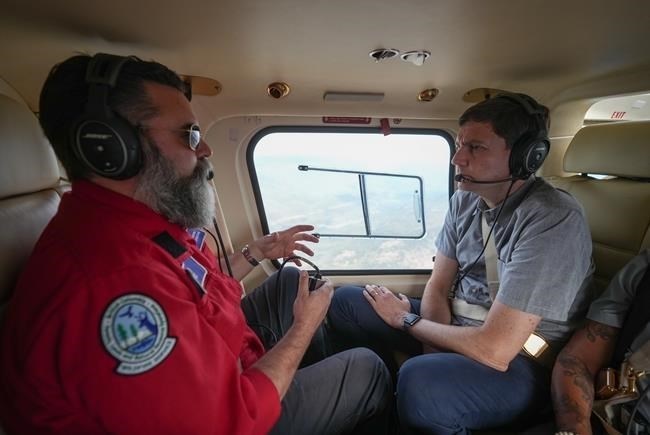
B.C. Premier David Eby, right, listens to Brad Litke, a BC Wildfire Service senior operations officer, while viewing areas of the Shuswap affected by the Bush Creek East wildfire, on a helicopter flight from Kamloops to Salmon Arm, B.C., on Monday, September 11, 2023.
Image Credit: THE CANADIAN PRESS/Darryl Dyck
September 11, 2023 - 2:00 PM
KAMLOOPS, B.C. - British Columbia will form an expert disaster task force to rapidly deploy to, respond to and support people and communities facing emergencies amid a historic wildfire season that has destroyed about 400 structures, mostly homes, said Premier David Eby.
Eby made the announcement Monday as he visited the North Shuswap Lake area, located about one hour east of Kamloops, where the Bush Creek East wildfire destroyed almost 200 structures.
"The goal here is that the task force will be working with the public service in partnership with the hard-working people from emergency response from the wildfire service to ensure we're deploying additional resources, we're deploying solutions as they're recommended to us," he said at a news conference in Kamloops.
Some local residents in the Shuswap area ignored evacuation orders to stay behind and protect homes from the fast-moving fire.
Hundreds of properties have been lost, thousands of people have been forced to evacuate their homes and two young firefighters have died on duty this summer as the worst wildfire season in the province's history continues, said Eby.
Then, there are further cascading threats of drought, landslides and floods that have become a new reality, the premier said.
"We don't have the luxury of time between emergencies right now in B.C.," he said. "There's a great deal of urgency because the scale of this wildfire season was so historic and because we're going into another season now where we're dealing with both drought and simultaneously the possibility of significant rainfall."
Eby said the profound effects of climate change have B.C. facing "near constant emergencies."
The premier did not provide complete details of the task force's structure, mandate, timeline or members other than suggesting it could include a mix of expert government, local and independent people, comprising municipal and wildfire services workers.
Eby said he wanted the task force to implement on-the-ground changes and deliver resources where and when needed.
The task force will provide advice on volunteer recruitment, work with First Nations and front-line workers and ensure support for evacuees is more accessible, he said.
Special attention will be given to improving timely access to emergency funds and accommodation, Eby said.
B.C. faces a situation where "somewhere around 400 structures, most of which people can assume are homes of folks in fire-affected areas, burned to the ground, were totally destroyed this year," he said.
Eby said he expected the B.C. task force to work with federal government disaster response programs and efforts.
Federal Emergency Preparedness Minister Harjit Sajjan said last week he has been speaking with local and provincial officials about developing a federal disaster response plan that could include a national firefighting force.
"We expect our task force will dovetail nicely with what they are doing," said Eby, adding the federal government has approached B.C. about working together on disaster response.
Eby said he is aware he is touring an area in the North Shuswap where some residents defied evacuation orders last month to fight the Bush Creek East wildfire that destroyed almost 200 properties, including the firehall at Scotch Creek.
He said he understands the conflicting emotions some people must have felt about being ordered to leave with the possibility that their home would be lost.
"I get that," he said. "I totally do, and I have huge empathy for that particular dilemma. I can't imagine what it's like to face that choice."
But Eby said evacuation orders are imposed to help firefighters save lives and protect property, and having to rescue people left in the fire zone limits other firefighting efforts.
"We're trying to find a way that we can really find that balance of using those community assets, those volunteers, but also ensuring that the fire effort focuses on saving homes instead of rescuing people who stayed behind," he said.
Windy conditions in the province have caused flare-ups on several of the more than 400 active wildfires in the province. More than 170 of those blazes are considered out of control.
Officials in the Okanagan said Sunday that they weren't expecting to lift any evacuation orders or alerts related to the McDougall Creek wildfire.
In an update, Central Okanagan Emergency Operations said hundreds of properties remain evacuated, including 122 in the hard-hit city of West Kelowna.
Properties still under evacuation orders due to the blaze "are more remote, topographically challenging and/or close to active wildfire areas," it added.
BC Hydro crews were still working to replace more than 400 power poles and other infrastructure damaged by flames, including 27 kilometres of power lines and dozens of pieces of equipment.
A statement from the power authority said other efforts are underway to make evacuated areas safe for returning residents, including restoring gas and water services, and removing problem trees and other hazards.
This report by The Canadian Press was first published Sept. 11, 2023.
News from © The Canadian Press, 2023